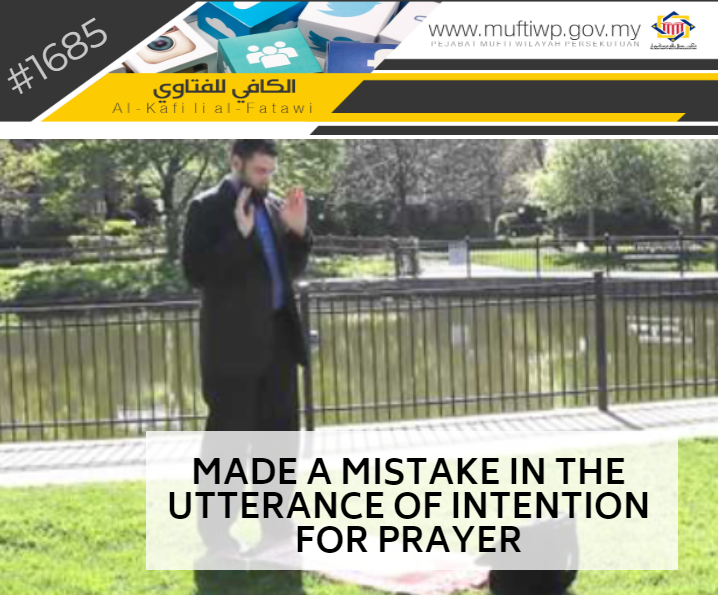Question:
Assalamualaikum wrm.wbt.,
Is my prayer valid if I made a mistake when uttering my intention for prayer? For example, I mistakenly said I’m going to perform Asar prayer when in fact my intention at the time is to perform Zohor prayer in my heart, or I mistakenly said Isya’ when I’m actually going to perform the Maghrib prayer and that is my intention in my heart. Jzakallah khair.
Answer:
Waalaikumussalam wrm. wbt.,
Alhamdulillah, praise and thanks to Allah for the countless blessings He has blessed us all with. Blessings and salutations to the Prophet Muhammad PBUH, his wives, his family, companions and all those that follow his teachings to the day of judgement.
Intention is a reminder of the purpose an act is performed. Intention is a valid condition of worship. This is in accordance to a hadith where the Prophet PBUH said:
إِنَّمَا الأَعْمَالُ بِالنِّيَّاتِ
“(The value of) an action depends on the intention behind it.”
Sahih al-Bukhari (1) and Sahih Muslim (1907)
In order for a prayer to be valid, a person must set his intention in his heart during takbiratul ihram and is aware of the purpose of the prayer when he recited the takbir, at the same time remembers the type of the obligatory prayer he is performing. Whereas the pronouncement of the intention for prayer is not a valid condition of prayer. (Refer Al-Fiqh al-Manhaji 1/129)
According to madhhab Syafie, it is sunnah to utter or pronounce the intention of prayer before the takbir, so that the tongue would help the heart, to prevent doubts and it is not far from the opinion of scholars who issued the fatwa that it is wajib to pronounce it. (Refer Nihayah al-Muhtaj, 1/340)
The final opinion of madhhab Syafie stated that the prayer of a person who only set his intention in his heart is valid without him uttering it with his tongue and this is the opinion of the majority of scholars. Thus, in this matter, according to Imam al-Nawawi, if a person intends in his heart to pray Zuhur while his tongue mistakenly said Asar, then his Zuhur prayer is still considered as valid. (Refer Al-Majmu’ Syarh al-Muhazzab 3/277)
Imam Jalaluddin al-Suyuti when commenting on the fiqh maxim al-umur bi maqasidiha (الأمور بمقاصدها) means that ‘every matter is considered according to its intention’ clearly states that the place of intention is in a person’s heart. Thus, from this concept, two maxims are concluded:
- It is insufficient to utter the intention with one’s tongue without setting the intention in his heart.
- It is not conditioned that the pronouncement of the intention must be together with the intention in a person’s heart.
From the first maxim, then the furu’ method was born which is if the utterance of intention is different from what is in one’s heart, then the intention in his heart is taken into consideration. For example, if a person set the intention in his heart to perform ablution while said that he wants to cool himself, then the ablution is valid but not its consequence. The same for if in his heart he intends to perform Zuhur prayer, however, he said Asar, then the intention considered is Zuhur. (Refer Al-Asybah wa al-Nazha’ir, pg. 30)
Conclusion
To conclude, we would like to state that the intention for worship is considered according to the intention in his heart and not what is pronounced. Thus, if the intention in a person’s heart is different from what he said, the one considered is in his heart and this does not affect the validity of worship.
Wallahua’lam.


